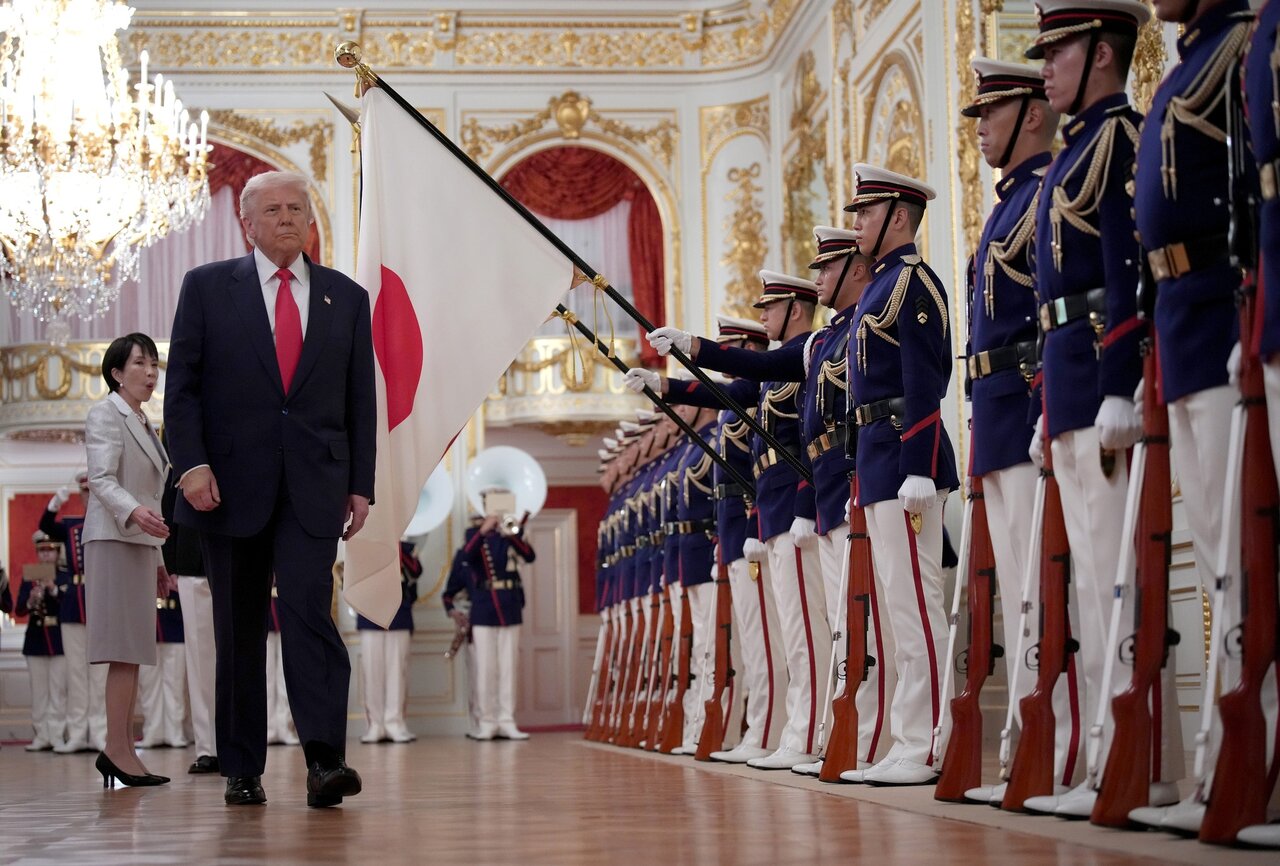
TEHRAN – The spectacle has become the point. Fighter jets escort Air Force One. Prime ministers arrive with golf relics and gold-leaf baubles. Foreign leaders orchestrate airport pageants and shield Donald Trump from protesters — not to salute partnership but to flatter a temperament that prizes adulation above counsel.
The WSJ has labeled it a “hospitality arms race,” and the phrase captures a worrying truth: diplomacy with the U.S. now prizes who can stage the most gilded display, not who can craft durable policy.
Shinzo Abe’s old playbook — sumo shows, custom trophies, charm offensive — metastasized into a global technique.
Though visibly nervous, Japan’s new Prime Minister Sanae Takaichi followed the script, presenting Trump with a putter once used by Abe and a gold leaf golf ball, while linking generous investment and defense pledges to the visit—an exercise in optics meant to flatter and pave the way for substantive concessions.
At the White House signing of the Armenia–Azerbaijan peace accord, Ilham Aliyev and Nikol Pashinyan vied in a competition of adulation, hailing Trump as the “sole architect of peace.”
Israel’s Benjamin Netanyahu, long adept at instrumentalizing Washington’s vanity, has refined the craft. At a July White House dinner, he theatrically presented Trump with a framed “Peace Prize nomination,” declaring him a man “forging peace in one country after another.”
The charade repeated at the Sharm el-Sheikh Summit in October. Pakistan’s Shehbaz Sharif gushed that Trump was “the most genuine candidate for the Nobel Peace Prize,” and that he is “genuinely a man of peace.”
Trump, glowing, later replayed Sharif’s remarks at rallies as proof of his “world respect,” oblivious to the derision the comments sparked in regional press.
“The Prime Minister said to me, ‘Mr. President, you saved millions of lives. You stopped that India war from going nuclear.’”
Even at home, the pattern persists. During a White House tech dinner, Meta’s Mark Zuckerberg proclaimed a $600 billion AI investment “inspired by Trump’s leadership,” only for a hot mic to catch him murmuring, “I wasn’t sure what number you wanted.”
The slip revealed what this new era of flattery demands: inflated figures and empty praise, offered not to shape policy, but to appease a presidency that confuses sycophancy with success.
Such gestures aren’t quaint ceremonialism. They are leverage, a soft auction in which praise is the entry fee for commercial and strategic favors.
That choreography does three things: it conceals, it redirects, and it corrupts.
It conceals itself because tightly staged visits keep protesters, watchdogs, and tough questions at bay; it redirects attention because headlines about “historic” handshakes often precede procurement promises and investment commitments that benefit narrow contractors; and it corrupts because access secured via personal flattery increasingly feeds private ventures tied to Trump’s circle.
The recent proliferation of World Liberty Financial’s token sales—majority-owned by Trump’s family—and a large Abu Dhabi investment illustrate the point: what appears to be private innovation can also serve as a vector for geopolitical influence that overlaps with presidential favor.
The domestic corollary is obvious. When the White House’s foreign policy cadence aligns with deals that enrich allies — or family — the guardrails fray.
Reporting has tied high-profile crypto deals, chip export relaxations, and Trump’s surprise pardon of Binance’s Changpeng Zhao into a pattern where policy shifts and financial flows appear less like coincidence than quid pro quo.
That is not the ordinary give-and-take of diplomacy; it is a marketplace in which personal loyalty and private profit shape state action.
This posture will be on display at the C5+1 summit on November 6, when the presidents of Kazakhstan, Kyrgyzstan, Tajikistan, Turkmenistan, and Uzbekistan visit Washington.
Expect the summit to be framed first as theater: photo ops, symbolic gifts, and promises that may read well in press releases yet leave implementation and procurement terms murky.
That gap is where leverage converts into extraction, and where local autocrats can trade away rights and revenues for headline-friendly pledges.
The deeper damage is reputational and institutional. A so-called superpower that allows its diplomacy to be shaped by vanity and private enrichment forfeits moral authority and invites humiliation.
The degradation is not merely embarrassing — it is dangerous. Statecraft is being hollowed into a marketplace of gilded favors, where flattery buys access and access buys policy.
Disclaimer : This story is auto aggregated by a computer programme and has not been created or edited by DOWNTHENEWS. Publisher: tehrantimes.com





